Program Information
Speakers
Sponsors
CEU Information
For questions, contact our Education Team at education@sensoryhealth.org.
Add-on AOTA CEUs Option Available for an Additional $90
Includes Certificate of Completion and 1.2 AOTA CEUs
Add-on ASHA CEUs Option Available for an Additional $75
Includes Certificate of Completion and reporting your credits to the ASHA CE Registry*
*This is a separate fee from the annual ASHA CE Registry fee that is processed by ASHA
Virginia Spielmann, PhD, OTR/L (she/her) (Co-Host)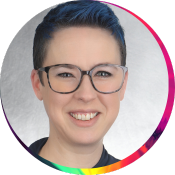
Executive Director
USA
Virginia is a well-travelled speaker, coach and educator on topics including sensory integration, DIR/Floortime, child development and infant mental health. She has conducted trainings in Kenya, Australia, the Philippines, Vietnam, Hong Kong, and the USA and leads workshops at international conferences.
Virginia is a founder and former Clinical Director of SPOT (Speech, Physical, and Occupational Therapy) Interdisciplinary Children's Therapy Center in Hong Kong, where she led a large and widely respected inter-disciplinary team.
Virginia obtained her BSc in Occupational Therapy in Oxford England (2002) and her Masters in Occupational Therapy from Mount Mary University, Milwaukee (2018). She is a DIR/Floortime Training Leader and Expert and clinical consultant for the Interdisciplinary Council for Development and Learning (ICDL). Her extensive pediatric experience includes children on the autism spectrum, as well as those with Sensory Processing Disorder, infant mental health issues, adoption, developmental trauma.
Virginia has considerable post-graduate training, she is certified on the SIPT and is currently completing her Ph.D. in Infant and Early Childhood Development with an emphasis on mental health, with Fielding Graduate University, in Santa Barbara. She is a published author and contributed to the STAR Frame of Reference as part of the 4th Edition of Frames of Reference for Pediatric Occupational Therapy, alongside Dr. Miller and Dr. Schoen.
Morénike Giwa Onaiwu, PhD(c), MA (she/they) (Co-Host)
Advocate/Public Speaker/Writer
USA
Morénike Giwa Onaiwu, PhD(c), MA (she/they) is a global advocate, educator, and autistic person of color in a neurodiverse, multicultural, serodifferent family. A prolific writer, consultant, and social scientist/activist whose work focuses on meaningful community involvement, human rights, intersectional justice, and inclusion, Morénike is a Humanities Scholar at Rice University’s Center for the Study of Women, Gender, and Sexuality, Co-Chair of the Women’s HIV Research Collaborative, and a member of several executive boards.
Morénike has been an invited speaker at the United Nations, the White House, and numerous peer-reviewed international conferences in addition to contributing author/editor of several publications, abstracts, and books focusing on community engagement, intersectionality, disability, advocacy, and inclusion. Publications of note include the first anthology on autism and race All the Weight of Our Dreams: On Living Racialized Autism, a 2021 edited collection from Beacon Press Sincerely, Your Autistic Child: What People on the Autism Spectrum Wish Their Parents Knew About Growing Up, Acceptance, and Identity, and the forthcoming Neurodiversity en Noir: A Collection of Black Neurodiverse Voices from Jessica Kingsley Publishing (2022).
Follow Morénike’s work at https://MorenikeGO.com
Kieran Rose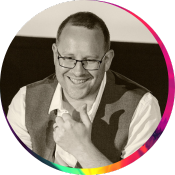
Consultant, Writer, Advocate
United Kingdom
Kieran Rose is a published Writer and International Public Speaker whose essays at www.theautisticadvocate.com have been read by over a million people and cited in numerous research papers.
With a background in Education and service delivery, Kieran delivers his own specialist Autism training to families and Professionals and provides private consultancy for charities and organisations across the world that support Autistic children, adults and their families. An experienced international public speaker, Kieran regularly delivers paid webinars and has also guest-lectured at Universities across the UK.
He is Founder and Chair of The Autistic Cooperative , an International network and lobbying group for Autistic Professionals; and is Managing Director of the Social enterprise Infinite Autism, which supports Autistic people and families through funded partnership working in the North East of England.
Kieran is an executive board member of the Therapist Neurodiversity Collective, a US-based non-profit international network and lobbying organisation of Neurodiverse positive Speech and Language Therapists and Occupational Therapists.
He has also consulted on a number of research papers covering Autistic Masking, Autistic Burnout, Autistic relationships, the voices of young Autistic people and Mate Crime in the Autistic community; and is co-producing research into Autistic masking and Victimisation.
Kieran was diagnosed Autistic in 2003 at the age of 23; He is married with three children, two of whom are diagnosed Autistic. They all live in the UK with two cats and a collection of co-occurring conditions. Kieran is invested in challenging the current Autism narrative, supporting the Neurodiversity paradigm and is an advocate for the rights of all Autistic people.
Cultivating Supportive Lifestyles for Late-identified Autistic People
This presentation will focus on the experiences of being late-identified and provide concrete steps which can be performed by a late-identified Autistic person personally, with support from others, or directly by an allied health professional, in order to foster and cultivate a supportive lifestyle. This presentation will highlight the need for a shift in self-understanding both by Autistic people, and externally by health professionals.
After participating in this session, attendees should be able to:
- To analyse the unique context of being late-identified
- To understand the barriers faced by Autistic people in cultivating a supportive lifestyle
- To identify foundational active steps for Autistic people may take independently or interdependently to cultivate a supportive lifestyle
- To identify foundational active steps Allied Health Professionals may take to support Autistic people to cultivate a supportive lifestyle.
- To highlight the importance of reflective practice and a Neuro-inclusive
Rachael Thompson, BSc, PGCE with QTS, MSc Occupational Therapy, PGCert Sensory Integration 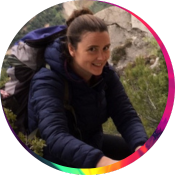
Occupational Therapist
United Kingdom
Rachael has worked at independent specialist colleges and schools in the UK for over 10 years in roles including Tutor, Occupational Therapist, Head of Education, and Vice Principal. Rachael recently co-founded a small independent specialist school in the UK.
As an autistic individual and Occupational Therapist, Rachael utilizes personal and professional experience alongside the latest research to explore sensory processing differences and specifically how sensory processing differences can impact health, well-being, and quality of life.
Sensory Processing, Autism and Identity
In this presentation, I will consider the impact of interoceptive and proprioceptive processing differences on formation of a sense of self. Following this I will explore how sensory processing differences can impact the development of self-identity, collective identities and gender identity. I will conclude with suggestions as to how to support individuals to develop positive self and collective identities.
After participating in this session, attendees should be able to:
-
Identify how sensory processing differences can impact self-identity.
-
Analyse how sensory processing differences can create challenges with formation of collective identities.
-
Describe how sensory processing differences can influence an individual's experience and expression of gender.
-
Evaluate sensory processing considerations when formulating support for individuals' development of positive identities.
Iris Warchall, PT, DPT (she/they) 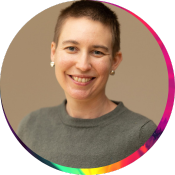
Autistic Physical Therapist/ Advocate
USA
Iris Warchall, PT, DPT is an Autistic self-advocate, parent to an Autistic child, and physical therapist specializing in supporting adults with a variety of the health conditions more prevalent among autistic people, including hypermobility spectrum conditions, pelvic health concerns, chronic pain, dizziness and vestibular dysfunction, and movement disorders. In addition to her clinical practice, Iris provides training for physical therapists and other professionals on implementing neurodiversity-affirming practices. They are passionate about doing their part to bring insights from the Autistic community and Autistic-led research to the physical therapy and broader healthcare community in order to improve the standard of care for autistic individuals across the lifespan.
Rethinking Movement: Exploring Sensory and Motor Integration
Sensory integration and motor development go hand in hand. Understanding autistic sensorimotor developmental differences and disability and autistic people’s lived experiences of movement differences can help inform our understanding of how to best support autistic people to participate in the activities in which they wish to engage. This presentation will summarize recent research on autistic sensorimotor developmental differences and the perspectives of autistic youth and adults on their experiences of motor difference and disability. The information covered will be of interest to anyone supporting autistic children and/or adults, including occupational and physical therapists, speech therapists, psychotherapists, family members, and other support persons.
After participating in this session, attendees should be able to:
-
Describe common autistic sensorimotor developmental differences
-
Discuss reasons autistic people may benefit from increased identification and support of motor disability
-
Summarize themes of autistic experiences of participating in physical activity and developing motor skills
-
Discuss considerations professionals should take when supporting autistic people with movement differences and disability
Caroline Gaddy, MFA, MA CCC-SLP 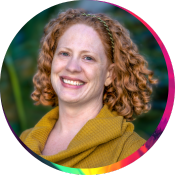
Speech Language Pathologist
USA
Caroline Gaddy, MFA, MA, CCC-SLP (they/she) is a speech-language pathologist, AAC specialist, disability advocate, and neurodiversity educator based in Virginia. They have presented on AAC and neurodiversity-affirming practices at state and national conferences. They have experience in the medical, private practice, and school settings with adult and pediatric populations. Caroline is passionate about disability justice and inclusion, and firmly believes that communication is a fundamental human right.
Alexa Herrera, OTD, OTR/L, (she/her)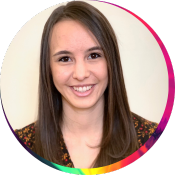
Occupational Therapist
USA
Alexa graduated from Colorado State University with a Bachelor of Science in Health and Exercise Science. She then went on to complete her Doctorate of Occupational Therapy at Belmont University. Alexa’s doctoral capstone was on the role of occupational therapy in postural orthostatic tachycardia syndrome (POTS) and sensory modulation in POTS. She has spoken on POTS at the AOTA Inspire Conference and Dysautonomia International Annual Conferences.
Alexa has experience practicing in outpatient, early intervention, and home health settings. Alexa is passionate about providing neurodiversity-affirming care. She also has experience with adapting augmentative and alternative communication (AAC) devices to facilitate access and navigation. Alexa has completed the STAR Institute Intensive Mentorship Program Level 1.
Sensory Integration & AAC: Fostering Autonomy in Communication (Part 1 & 2)
These transformative webinars are to revolutionize incorporation of Augmentative and Alternative Communication (AAC) within sensory integration therapy.
Discover the untapped potential of AAC as a tool for fostering autonomous communication in children with complex communication needs. Break away from the conventional fallbacks of visual schedules and controlled/limited choices and learn dynamic strategies to support and enhance engaging and client-led sensory integration sessions.
Attendees will leave equipped with age-appropriate, inclusive communication strategies that honor each child's individuality and communication style. Transform your practice and empower the children you work with to express themselves with confidence and complexity in the sensory gym and beyond.
After participating in this session, attendees should be able to:
-
Discuss the importance of agency in AAC usage, and how sensory integration approaches can facilitate a more self-determined individual.
-
Identify practical methods to seamlessly integrate AAC devices into the sensory gym environment, encouraging spontaneous and self-initiated communication.
-
Restate strategies that facilitate complex and pretend play using AAC and enable children to express their creativity and engage fully in play narratives.
-
Discuss the necessity of fostering non-compliance, a critical developmental milestone, and strategies to do so when using AAC as a means for children to assert their preferences and make choices.
-
Apply principles that foster self-organized, autonomous communication, moving beyond limited choice paradigms.
-
List three strategies that support communication even when the child is dysregulated.
Megan Anna Neff, PhD
Clinical Psychologist
USA
Dr. Megan Anna Neff (She/They) is a neurodivergent Clinical Psychologist and founder of Neurodivergent Insights where she creates education and wellness resources for neurodivergent adults. Additionally, she is co-host of the Divergent Conversations podcast.
As a late-diagnosed AuDHDer (Autistic ADHD), Dr. Neff applies their lived experiences from a cross-neurotype marriage and parenting neurodivergent children to their professional focus. They are committed to broadening the mental health field's understanding of autism and ADHD beyond traditional stereotypes. This personal-professional blend enriches their work and advocacy within neurodiversity.
Dr. Neff is the author of Self-Care for Autistic People and a forthcoming book on Autistic Burnout. Additionally, she has published in several peer-reviewed journals on topics ranging from neurodivergence, place attachment, relational psychoanalysis, social psychology, and integration of spirituality into psychotherapy.
Passionate about distilling complex research into visually accessible formats, she translates research into visual pixels which you can find on her website, Instagram, and digital workbooks. Additionally, Dr. Neff is passionate about community building and creating digital communities by and for neurodivergent individuals.
Sensory Awareness and Self-Advocacy: Empowering Autistic Individuals towards Self-Actualization
This presentation will explore the foundational connection between sensory awareness, sense of self, and self-advocacy in enhancing the well-being of Autistic individuals. This talk seeks to equip occupational therapists and therapists with the knowledge to cultivate a sensory lens, crucial for supporting Autistic people. By addressing the challenges and barriers Autistic people often face in achieving sensory awareness, including the profound effects of traumatic invalidation on their sense of self, this presentation emphasizes the significance of understanding sensory experiences in forming a robust sense of self.
Acknowledging the impact of such invalidation illuminates the critical role therapists play in validating sensory experiences to support self-advocacy and empowerment. Participants will be guided through practical strategies to aid Autistic adults in articulating their sensory needs and preferences, thereby fostering self-advocacy and empowering them towards self-actualization. Incorporating lived experience, professional insights, and research findings, this session is designed to inspire and educate therapists on fostering sensory comprehension and advocacy skills in their practice, with a heightened awareness of the need for a trauma-informed approach.
After participating in this session, attendees should be able to:
-
Identify and Describe Barriers to Sensory Awareness: Effectively identify and describe the common obstacles Autistic individuals encounter in recognizing and communicating their sensory experiences.
-
Examine the Impact of Traumatic Invalidation on Sensory Awareness and Sense of Self: Explore and understand how experiences of traumatic invalidation related to sensory differences can affect Autistic individuals' sense of self and their sensory awareness. Develop strategies to support autistic individuals in overcoming these challenges, fostering a stronger, more positive sense of self-identity and empowerment.
-
Facilitate Sensory Awareness Practices: Attendees will develop a toolkit of at least three exercises and interventions aimed at increasing Autistic individuals' sensory awareness, enabling them to better navigate their environments.
-
Empower Self-Advocacy through Sensory Understanding: Through the presentation, attendees will learn to teach Autistic adults at least two self-advocacy strategies that leverage their sensory awareness, empowering them to seek accommodations and articulate their needs in personal and professional settings.
Kavitha Murthi, MS (OT), OTR, FHEA (UK) (she/her)
Occupational Therapist
USA
Kavitha Murthi is pursuing her doctoral studies in the Department of Occupational Therapy at NYU Steinhardt School of Culture, Education, and Human Development. She is collaborating with Counselor to the President, Dr. Kristie Patten, on a National Science Foundation (NSF) project titled “Developing Abilities and Knowledge for Careers in Design and Engineering for Students on the Autism Spectrum by Scaling Up Making Experiences.” Her research aims to investigate how interest-driven and strength-based engineering activities impact the learning and social development of autistic students. Kavitha is particularly interested in understanding how autistic adolescents interested in engineering and design engage in maker clubs to problem-solve independently using the Engineering Design Process (EDP). She is also dedicated to amplifying authentic autistic voices in her research by including her participants in the research process using a research process called Photovoice.
Kavitha collaborated with her participants in different stages of the research process, namely developing socially valid research questions, data collection, and data analysis. She has also authored several peer-reviewed journal articles; most notably, she co-authored practice guidelines for occupational therapy practitioners working with autistic individuals. She also has presented at several national and international conferences.
Before beginning her doctoral studies at NYU, Kavitha obtained her post-professional graduate degree in Occupational Therapy from the United Kingdom and completed her undergraduate studies in Occupational Therapy at the Maharashtra University of Health Sciences in India. In the United Kingdom, she was inducted as a Fellow by the Higher Education Academy for her deep commitment to developing a culturally sensitive course for undergraduate occupational therapy students. She has extensive experience as a registered clinical pediatric occupational therapist in Mumbai and Edinburgh.
Kavitha has been invited to be a guest lecturer at NYU, Queen Margaret University (UK), and internationally. She is also invited to guest in several podcasts in her profession, like the OT Potential, Everyday Evidence by AOTA, and the OT Lifestyle movement. She also was interviewed to be a part of a documentary called ‘Finding Me in OT.’ The American Occupational Therapy Association has also invited her to be a reviewer on panels of award committees.
Additionally, she has contributed to various research projects, notably the Global Co-operation on Assistive Technology with the World Health Organization, for which she was nominated by the World Federation of Occupational Therapists in 2019. Kavitha is passionate about serving her professional community and has been invited as a project implementation manager in critical projects like the Occupational Therapy Narrative Database as an advisor to the American Occupational Therapy Association Evidence-Based Practice and Knowledge Translation group.
Developing Emotional Intelligence and Co-regulation in the School Settings Using Strengths of Autistic Students
Kavitha Murthi and Nana Serwaa Akro will be presenting on the topic of emotional intelligence. They will begin by introducing the concept of emotional intelligence and discussing the various neuroanatomical components involved. They will then highlight the importance of co- regulation, explaining the sensory and cognitive factors that make it necessary. Lastly, they will explore several strength-based strategies that can be used to develop co-regulation and self-regulation skills.
After participating in this session, attendees should be able to:
-
Identify, recognize, and label the challenges related to emotional dysregulation in autistic children.
-
Discuss 2-3 sensory processes related to emotional dysregulation.
-
Share 4-6 strategies that promote strength-based emotional co- regulation.
Nana Serwaa Akrofi, OTD, OTR/L (she/her)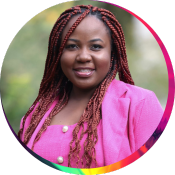
Occupational Therapist
Ghana & USA
Nana Serwaa Akrofi, OTD, OTR/L, is a Ghanaian occupational therapist with work experience in Ghana and the United States. Her clinical interests include working with children, autistic people, and marginalized disability groups. She is currently pursuing her Ph.D. at New York University. Her research interests include improving services for marginalized populations, occupational justice, and promoting culturally appropriate occupational therapy services. Her hobbies include watching comedy movies, reading, and writing poems.
Developing Emotional Intelligence and Co-regulation in the School Settings Using Strengths of Autistic Students
Kavitha Murthi and Nana Serwaa Akro will be presenting on the topic of emotional intelligence. They will begin by introducing the concept of emotional intelligence and discussing the various neuroanatomical components involved. They will then highlight the importance of co- regulation, explaining the sensory and cognitive factors that make it necessary. Lastly, they will explore several strength-based strategies that can be used to develop co-regulation and self-regulation skills.
After participating in this session, attendees should be able to:
-
Identify, recognize, and label the challenges related to emotional dysregulation in autistic children.
-
Discuss 2-3 sensory processes related to emotional dysregulation.
-
Share 4-6 strategies that promote strength-based emotional co- regulation.
Claudia Andrea Reveco Zamora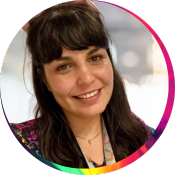
Occupational Therapist & Sexologist
Chile
As a specialist dedicated to the well-being of neurodivergent individuals, with a particular focus on the autistic spectrum, I have devoted over a decade to facilitating processes of self-awareness, identification, and diagnosis. My therapeutic approach is centered on the individual and grounded in mental health, gender perspective, intersectionality, and rights. Throughout my career, I have integrated various tools such as Sensory Integration, Occupational Therapy, Trauma-informed Therapy, Sexology Sciences, Augmentative and Alternative Communication (AAC), Innovation Strategies, and Empowerment.
Furthermore, I am actively engaged in specialized training in Compassion Focused Therapy and am currently pursuing my second Master's in Neuroscience of Happiness. I emphasize my commitment as a transaffirmative professional, supporting diversity in all its manifestations.
In my role as a university lecturer in postgraduate and specialization programs, I lead modules on the Autistic Spectrum and Transition to Active Adult Life in the Master's in Didactic Strategies in Autism at U.SEK. I have been interviewed and contributed as an OT-Sexologist and disseminator in notable publications such as Revista Paula (La Tercera newspaper, Chile), El Mostrador (digital newspaper, Chile), and Her Global Impact Magazine (Innovation Academy HGI, International). Additionally, I had the honor of participating in the documentary "Extraordinarias: united in neurodiversity" produced in Chile by Kimun, a creative production company.
With experience in university teaching for Occupational Therapy, Social Work, and Psychology programs, as well as conducting training sessions for professional teams in both public and private healthcare services and education teams in various settings, urban and rural, my passion for learning and teaching is evident in every aspect of my work.
As an additional note, I actively participate in the autistic and high-capacity community, identifying more broadly within the neuroqueer community. This central aspect of my identity adds significant value to my work, as I tirelessly strive for, with, and alongside my community.
Exploring Sexual Satisfaction in Autistic Individuals and its Relationship with Interoception and Alexithymia
Sexuality has multiple dimensions, in this presentation emphasis will be placed on the dimension of obtaining pleasure, from a sexual rights approach, understanding “sexual pleasure” as those pleasant physical sensations, such as genital arousal, orgasm and the erotic experience that depends not only on physical stimulation but also on the meaning attributed to it.
In autistic adults, the altered perception of the body’s internal sensations (interoception) can hinder the identification of physiological and emotional responses related to sexual arousal, which can influence sexual satisfaction. On the other hand, studies have shown that autistic adults have a higher prevalence of alexithymia compared to the general population, which can imply intrapersonal challenges such as understanding and expressing their sexual needs and desires, as well as interpersonal ones in sexual communication.
Therefore, sexual satisfaction in autistic individuals is influenced by interoception and alexithymia, and addressing these aspects through sensory and educational strategies can improve the quality of life of autistic people and their sexual well-being, considering that autistic adolescents and adults have far fewer sexual experiences than their neurotypical peers despite their expressed sexual interest. It is fundamental to promote full, safe and healthy sexual experiences, remembering that sexual rights are also human rights.
After participating in this session, attendees should be able to:
- Describe how the altered perception of internal bodily sensations (interoception) influence sexual satisfaction in autistic individuals.
- Describe how the difficulty in identifying and describing emotions (alexithymia) influence sexual satisfaction in autistic individuals.
- Identify intrapersonal and interpersonal challenges that autistic adults may experience in sexual communication.
- incorporate practices promoting sexual rights and teaching client self-advocacy as human rights into Occupational and Speech Language Therapy practice.
Jennifer Jo Brout, PhD 
Psychologist
USA
Dr. Jennifer Brout is a New York State-certified school psychologist, a Connecticut-certified professional licensed counselor, and holds a doctorate in school/clinical-child psychology. Disappointed by her own experiences with the state of the field when seeking help for her own child in 1999, Dr. Brout began efforts to establish better research practice, improved diagnosis, and innovative clinical practice related to auditory over-responsivity. Dr. Brout co-founded the Sensory Processing and Emotion Regulation Program at Duke University in 2008 (now the Misophonia and Emotion Regulation Program). She has authored three books on Misophonia Coping Skills utilizing a multidisciplinary approach to self-regulation for parents, adults and clinicians. She is also the mother of adult triplets (one with misophonia) and is a misophonia sufferer herself.
The Basics of Misophonia
This class is for professionals across disciplines including audiologists, mental health providers, and occupational therapists. It may also be useful to:
- Allied medical professionals.
- Teachers, professors, and school personnel.
- Human resource professionals.
- Anyone interested in learning more about misophonia, including those who
- experience misophonia
After participating in this session, attendees should be able to:
- Describe misophonia as a disorder that crosses numerous clinical disciplines.
- Discuss the Multidisciplinary Treatment of Misophonia.
- Explain the current research studies across disciplines.
- List five ways that people experience misophonia.
- Identify the clinical disciplines recommended for evaluations and treatment recommendations in a multi-disciplinary approach to helping people with misophonia.
- Describe the specific considerations for working with children and families
Kelly Mahler, OTD, OTR/L (she/her)

Occupational Therapist
USA
Dr. Kelly Mahler earned a Doctorate in Occupational Therapy from Misericordia University, Dallas, PA. She has been an occupational therapist for 22 years, serving school-aged children and adults. Kelly is winner of multiple awards, including the 2020 American Occupational Therapy Association Emerging and Innovative Practice Award & a Mom’s Choice Gold Medal. She is an adjunct faculty member at Elizabethtown College, Elizabethtown, PA as well as at Misericordia University, Dallas, PA. Kelly is a co-principal investigator in several research projects pertaining to topics such as interoception, self-regulation, trauma & autism. Kelly is an international speaker and presents frequently on topics related to the ten resources she has authored:
- The Interoception Curriculum: A Step-by-Step Framework for Developing Mindful Self-Regulation–winner of Mom’s Choice Award Gold Medal
- Interoception Activity Cards–winner of Mom’s Choice Award Gold Medal
- Interoception Yoga Cards
- Interoception Exercise Cards
- My Interoception Workbook: A Guide for Adolescents, Teens and Young Adults
- The Comprehensive Assessment of Interoceptive Awareness-3rd edition
- Interoception: The Eighth Sensory System
Reconnecting with Bodily Self Via Interoception Our 8th Sense
Interoception is one of the hottest topics in neuroscience and has shed light on the value of listening to and understanding our internal body signals. How connected are you to your inner self? How connected are your clients? Research shows that interoceptive awareness is foundational to self-care and positive mental health and this interoception science has encouraged a shift forward towards more affirming supports. This course will offer a discussion on common lived experiences that can derail interoceptive awareness as well as protective or restorative strategies that can nurture (re)connection to the body. Come take an inner selfie as we explore the lived experience and science of this important topic.
After participating in this session, attendees should be able to:
- Describe Interoception and how it can support participation in many aspects of daily life
- Identify at least 2 factors that can derail the interoception experience
- Identify at least 2 strategies that can nurture or restore the interoception experience
Sandra Yellowhorse, PhD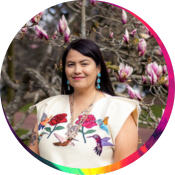
Educator
New Zealand
Sandra is Kinyaa'aanii (Towering House People) born for the French of the Diné Nation (Navajo). She is disability justice scholar, Indigenous researcher and parent of a neurodiverse young person, who is her life’s joy. She received her PhD in Education from Waipapa Taumata Rau/The University of Auckland with Te Puna Wānanga the School of Māori and Indigenous Education in Aotearoa New Zealand. Her dissertation, Looking from Niłtsa bii’aad: A Diné Perspective of Disability and Ontologies of Being, was written for her daughter, as a gift and a promise. Sandra wanted her to always know that their ancestors understood the inherent diversity in the world and valued all people and life as part of a greater whole. These teachings have much to offer our children and young people in all their diverse ways of being.
Sandra currently works in the fields of Critical Indigenous Disability Studies and Indigenous Inclusive Education. She works in solidarity with other Indigenous scholars exploring ‘disability’ and autism within their cultural identities. By advancing these narratives, she seeks to unravel understandings of ‘disability’ outside of Western biomedical and social constructs. Sandra is passionate about Indigenous voice and worldbuilding. She aspires to help build new systems based on ancestral wisdoms found in Indigenous cultures around the world and uplift these teachings rooted in love, relationality, reciprocal accountability, care, belonging and community.
Indigenous Perspectives of Neurodiversity
At the heart of re-indigenization is healing. Join in conversation with Dr. Sandra Yellowhorse as we explore indigenous perspectives on disability, education, and neurodiversity. Dr. Yellowhorse, an expert in indigenous inclusive education and educational philosophy, will share her research on recovering ancestral stories of disability from the Diné people, offering unique insights into how they perceive uniqueness.
Discover the profound connection between indigenous ancestral knowledge, land-based pedagogy, and the importance of connecting to land, place, and community through ancestral wisdom and stories. Dr. Yellowhorse will delve into the wisdom of the body and the transformative potential of embracing diversity in how people engage with their environments, including sensory-based behaviors that transcend neuronormative expectations.
This enlightening discussion will provide alternative frameworks rooted in indigenous knowledge, offering fresh perspectives on understanding disability, education, and neurodiversity. By fostering right relations with the natural world, we can reshape our approach to these topics.
Join us to gain valuable insights from Dr. Sandra Yellowhorse and explore how indigenous wisdom can reshape our understanding of disability, education, and neurodiversity.
After participating in this session, attendees should be able to:
-
Integrate Indigenous perspectives and knowledge into their practice to better support neurodivergent families.
-
Identify new, expanded understanding of cultural humility and supports for indigenous populations in alignment with AOTA's guidelines on cultural competence and diversity
-
Demonstrate an understanding of the impact of using inclusive language and acceptance in creating healthy environments for individuals with autism within Indigenous communities.
-
List practical strategies for incorporating holistic models into Western approaches, practices, services, and supports for neurodivergent populations.
-
Analyze the risks of deficit-based research and stereotyping in the context of health issues faced by specific populations, such as Indigenous Peoples, and will explore ways to promote allyship, cultural continuity, and sensory-friendly cultural events.
